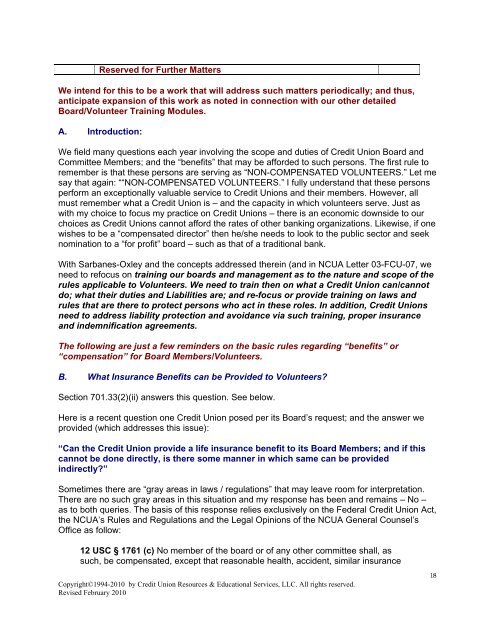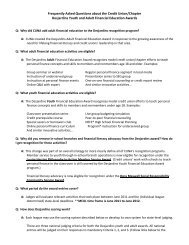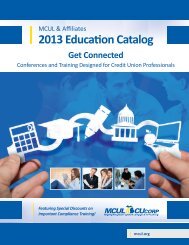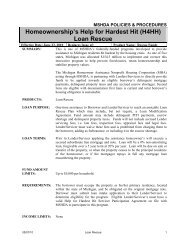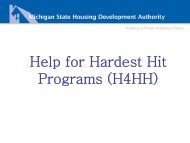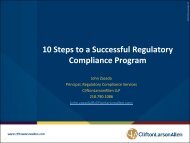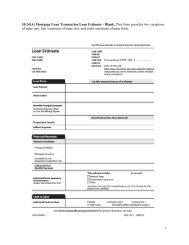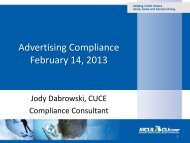regulatory and compliance issues and considerations
regulatory and compliance issues and considerations
regulatory and compliance issues and considerations
Create successful ePaper yourself
Turn your PDF publications into a flip-book with our unique Google optimized e-Paper software.
Reserved for Further Matters<br />
We intend for this to be a work that will address such matters periodically; <strong>and</strong> thus,<br />
anticipate expansion of this work as noted in connection with our other detailed<br />
Board/Volunteer Training Modules.<br />
A. Introduction:<br />
We field many questions each year involving the scope <strong>and</strong> duties of Credit Union Board <strong>and</strong><br />
Committee Members; <strong>and</strong> the “benefits” that may be afforded to such persons. The first rule to<br />
remember is that these persons are serving as “NON-COMPENSATED VOLUNTEERS.” Let me<br />
say that again: ““NON-COMPENSATED VOLUNTEERS.” I fully underst<strong>and</strong> that these persons<br />
perform an exceptionally valuable service to Credit Unions <strong>and</strong> their members. However, all<br />
must remember what a Credit Union is – <strong>and</strong> the capacity in which volunteers serve. Just as<br />
with my choice to focus my practice on Credit Unions – there is an economic downside to our<br />
choices as Credit Unions cannot afford the rates of other banking organizations. Likewise, if one<br />
wishes to be a “compensated director” then he/she needs to look to the public sector <strong>and</strong> seek<br />
nomination to a “for profit” board – such as that of a traditional bank.<br />
With Sarbanes-Oxley <strong>and</strong> the concepts addressed therein (<strong>and</strong> in NCUA Letter 03-FCU-07, we<br />
need to refocus on training our boards <strong>and</strong> management as to the nature <strong>and</strong> scope of the<br />
rules applicable to Volunteers. We need to train then on what a Credit Union can/cannot<br />
do; what their duties <strong>and</strong> Liabilities are; <strong>and</strong> re-focus or provide training on laws <strong>and</strong><br />
rules that are there to protect persons who act in these roles. In addition, Credit Unions<br />
need to address liability protection <strong>and</strong> avoidance via such training, proper insurance<br />
<strong>and</strong> indemnification agreements.<br />
The following are just a few reminders on the basic rules regarding “benefits” or<br />
“compensation” for Board Members/Volunteers.<br />
B. What Insurance Benefits can be Provided to Volunteers?<br />
Section 701.33(2)(ii) answers this question. See below.<br />
Here is a recent question one Credit Union posed per its Board’s request; <strong>and</strong> the answer we<br />
provided (which addresses this issue):<br />
“Can the Credit Union provide a life insurance benefit to its Board Members; <strong>and</strong> if this<br />
cannot be done directly, is there some manner in which same can be provided<br />
indirectly?”<br />
Sometimes there are “gray areas in laws / regulations” that may leave room for interpretation.<br />
There are no such gray areas in this situation <strong>and</strong> my response has been <strong>and</strong> remains – No –<br />
as to both queries. The basis of this response relies exclusively on the Federal Credit Union Act,<br />
the NCUA’s Rules <strong>and</strong> Regulations <strong>and</strong> the Legal Opinions of the NCUA General Counsel’s<br />
Office as follow:<br />
12 USC § 1761 (c) No member of the board or of any other committee shall, as<br />
such, be compensated, except that reasonable health, accident, similar insurance<br />
Copyright©1994-2010 by Credit Union Resources & Educational Services, LLC. All rights reserved.<br />
Revised February 2010<br />
18


